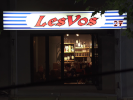Eye For Film >> Movies >> Home Ground (2022) Film Review
Home Ground
Reviewed by: Jennie Kermode

Where South Korean cinema has boomed over the past two decades, making a big impression on audiences worldwide, some subjects are still significantly under-represented within it. Despite some superb efforts – A Distant Place and A Girl At My Door spring to mind – there is very little queer Korean cinema, and this reflects a tendency toward cultural and social neglect of LGBTQ+ communities in the country more generally. Given this, it’s fascinating to get a cinematic glimpse into the history of one of those communities courtesy of director Kwon Aram, whose documentary served as the closing gala of the 2023 Queer East film festival in London.
The subject is South Korea’s lesbian community and its development in the 1990s. To put it in perspective, one must understand that this was a period more equivalent to the 1950s in the West, as far as social awareness was concerned. Many lesbians grew up believing that their experience of attraction must be unique, and that they would never find other people like themselves. When a few of them did succeed in finding one another, they formed a society called Kirikiri. The mother of one of them had a basement café which they converted into their first social gathering space, LesVos.

LesVos functioned as a beacon for isolated individuals, accepting women of all ages, agreeing not to serve alcohol so that teenagers could be admitted. Cherry coke floats with umbrellas, and kimchi fried rice topped with fried egg, became its specialties. There were rules – as in some equivalent venues in the West at that time, long hair was banned, but this translated rather differently. We see photos of women sporting cute little bobs which would definitely be read as feminine elsewhere. The important thing, of course, was simply that they distinguish themselves from women conforming to a traditional way of living.
In many cases, such traditions were difficult to escape. The women discuss how they helped others to find work so that they could support themselves independently and avoid being pressured into marriage. This was very much a feminist space, and that consciousness remains pertinent today. Research has shown that lesbian and bisexual women worry a lot less than straight women about conforming to conventional beauty standards – simply because they know from experience that a much wider range of women can be attractive – but in a discussion of ageing here, that’s palpable.
At the centre of it all is Myong Woo-hyung – “Don’t call me Auntie” she warns – who has kept the community together through thick and thin, including at the point when LesVos’ license was suspended following accusations of ‘decadence’ which, the women say, make their behaviour there sound much more exciting than it was. During the early stages of the Covid pandemic, LesVos and similar venues were again threatened, with claims that they were being reckless, and she endeavours to explain the different impact of isolation on people with prior experience of exclusion and familial rejection.
At the end, Myong discusses how she’s trying to confront her own prejudices and acts of discrimination. We see how this led to the development of a second community centred around Sinchon Gongwon, a park where young queer people who didn’t fit in went to hang out with one another. Admitting that their way of seeing the world seems strange to her, she is nonetheless ready to accept them now. We also see her at a Transgender Day of Remembrance event, still campaigning to break down barriers. Where others might feel exhausted after such a life, she seems energised by it, able to reflect on her accomplishments with real pride.
An important contribution to the record, Home Ground succeeds – like Myong – in doing a lot with the material available to it. When lesbian visibility in Korea reaches the stage at which people start complaining that it’s an unnecessary new-fangled idea, this will prove them wrong.
Reviewed on: 01 May 2023
















